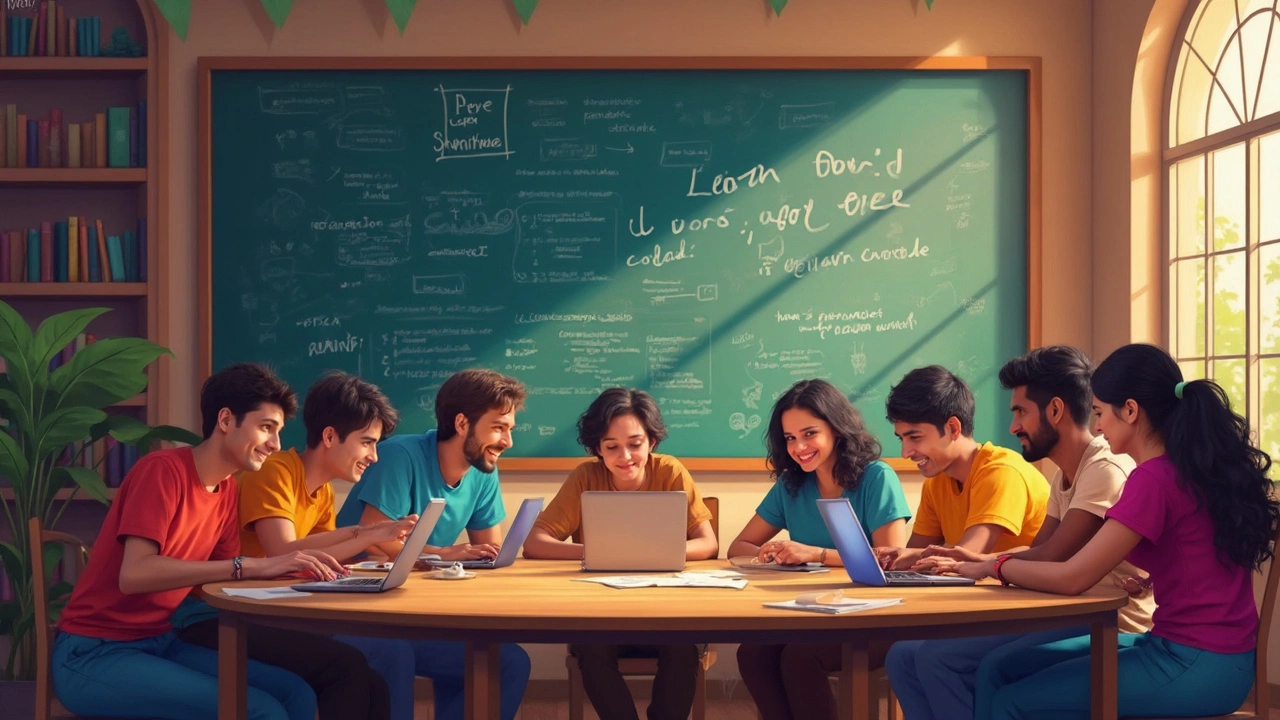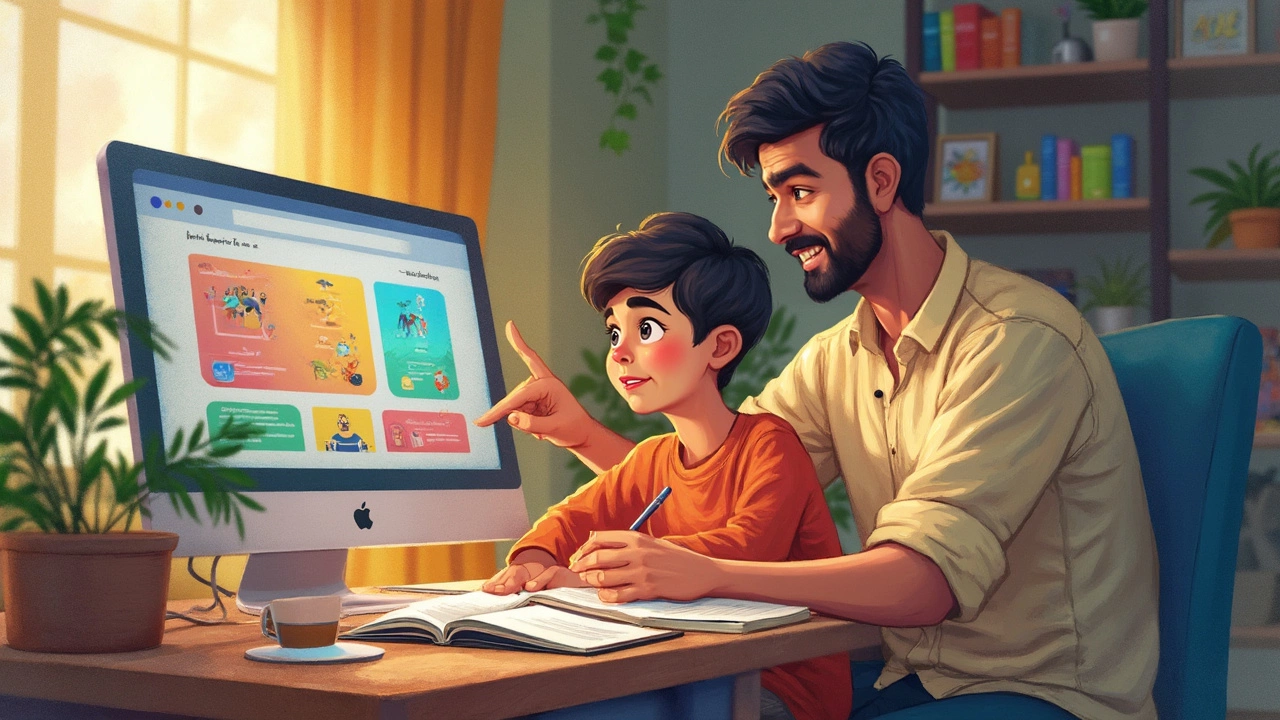Learning to code without paying anything might sound too good to be true, but it’s 100% possible if you know where to look and how to stay motivated. You don’t need fancy degrees or pricey subscriptions to start. Plenty of future coders have built real skills—and even landed jobs—using free resources online.
Here’s the trick: not all free classes or tutorials are created equal. Some offer bite-sized videos that barely scratch the surface, while others hand over the full-on bootcamp experience at no cost. You get to pick what works for you, but you’ll need a bit of patience and a game plan.
Feeling overwhelmed by all the options? Don’t worry. This guide will break down which platforms are actually helpful, how to spot quality content, and ways to keep yourself moving forward without feeling lost. Coding for free isn’t a myth—people all over the world do it every day. Why not you?
- The Truth About Free Coding Resources
- Best Places to Start Coding for Free
- How to Structure Your Free Learning Path
- Common Pitfalls and Smart Workarounds
- Making the Most of Free Coding Communities
The Truth About Free Coding Resources
If you search for free ways to learn coding, you’ll stumble on thousands of options. But are they all good? Not really. Some sites give you a solid start, while others are just ad-filled clickbait or super outdated. So, what should you know before jumping in?
Let’s get real: the most popular coding platforms—think freeCodeCamp, Codecademy (for free versions), Khan Academy, and The Odin Project—aren’t just popular because they’re free. It’s because loads of people have actually learned to code with them. freeCodeCamp, for example, has over 40,000 graduates working at tech giants like Google and Microsoft. Pretty impressive for a no-cost course, right?
Still, there’s no magic here. Free doesn’t always mean easy. You’ll need patience, and you might have to piece together your learning from several places. Think of it as building a playlist from your favorite songs, except here you’re stitching together coding topics.
- learn coding free resources range from text guides to interactive games. Some focus on basics like HTML and CSS, while others dig into Python, JavaScript, or even full-stack development.
- Major universities like Harvard and MIT actually host full computer science courses online—completely free—on platforms like edX and Coursera. You can even get certificates, sometimes just by paying a small fee (if you want one).
- YouTube is packed with crash courses—some under two hours—that walk you through real-world projects, so you can see how pros approach problems.
Wondering which languages people are learning for free? Python is easily the hottest starter language in free courses, followed by JavaScript and HTML/CSS.
| Platform | Users (2024) | Main Languages |
|---|---|---|
| freeCodeCamp | 10M+ | JavaScript, Python, HTML, CSS |
| The Odin Project | 2M+ | JavaScript, Ruby, HTML, CSS |
| Khan Academy | 5M+ | JavaScript, HTML, CSS |
| Codecademy (free tier) | 20M+ | Python, Java, HTML, CSS, JavaScript |
Bottom line: tons of people get started with coding for free. Just make sure to check if the material fits your skill level and goals. Don’t be afraid to try different platforms—if one feels confusing, move to another. There’s no penalty for bouncing around until you find your groove.
Best Places to Start Coding for Free
Finding solid places to jump into coding for free isn’t hard, but choosing the right ones can make or break your start. You want platforms that explain things in plain English and give you a chance to mess around with code, not just watch endless lectures. Here’s where tons of beginners actually make progress—even when they have zero cash to spend.
- freeCodeCamp. This is the king for self-taught coders. They offer a full set of certifications from basic HTML to advanced APIs, and their community is super active if you get stuck. Over 40,000+ users landed jobs after using it.
- Codecademy (Free Tier). Not everything here is free, but their basics in Python, JavaScript, and web development give you hands-on practice. If you ever want to pay for more, you can, but the free section is enough for most newbies.
- Coursera & edX. These two host university-level courses. Look for "audit" or "free" options to access all lectures and assignments without paying. Stanford and Harvard both offer intro programming classes here.
- Khan Academy. Perfect for absolute beginners. Learn using interactive exercises, especially in JavaScript and drawing animations with code.
- The Odin Project. Totally free, this one is for folks who prefer building real projects (think websites you can actually show off). Super detailed curriculum and a friendly online community.
A lot of these websites have Slack or Discord communities. Don’t be shy—join them and ask questions, even if you feel lost. You’d be surprised how many learners got support just by speaking up.
It’s not just about picking a site though. It helps to know what each offers up front or you’ll bounce around endlessly. Here’s a handy table showing what’s covered and the typical style of learning you can expect:
| Platform | Main Focus | Style | Certificates/Projects |
|---|---|---|---|
| freeCodeCamp | Full stack/dev tools | Hands-on, project-based | Yes/Yes |
| Codecademy (Free) | Syntax, basics | Interactive, guided | No/Limited |
| Coursera/edX | University theory | Lectures, assignments | Sometimes/Depends |
| Khan Academy | JavaScript, web basics | Interactive, kid-friendly | No/Some small projects |
| The Odin Project | Web Dev (Full stack) | Project-based, self-paced | No/Yes |
Bounce between a few of these depending on your goals, or double down on the one that feels the most fun. The most important thing is actually getting your hands dirty with code—that’s where the learning happens. If your goal is to learn coding free, these places can be your launchpad. Start poking around, and you’ll see there’s nothing stopping you.

How to Structure Your Free Learning Path
Getting started with free coding resources is exciting, but winging it rarely works. You want a road map so you don't waste time spinning your wheels. First, figure out what you actually want to build—websites, mobile apps, games—or if you just want to explore basic programming. Your answer helps pick where to focus next.
Start with the basics. If you're totally new, languages like Python and JavaScript are everywhere, beginner-friendly, and have tons of free support. Python is great for newbies, no matter what background you come from. JavaScript is perfect if you like the idea of making websites do fun things. The trick is to master the basics first, and only then branch out.
Setting goals gives structure. Try the SMART method: Specific, Measurable, Achievable, Relevant, and Time-bound. For example, "Finish 20 coding challenges in two weeks using freeCodeCamp." It helps keep you accountable and motivated.
Here’s a flow that works for a lot of self-taught coders:
- Pick one language to focus on first. Chasing too many at once gets overwhelming fast.
- Choose a main platform—like freeCodeCamp, The Odin Project, or Khan Academy. Sticking to one prevents information overload.
- Set clear, small milestones (example: build a portfolio site, make a calculator app).
- Mix in hands-on practice with reading and video tutorials. Interactive sites—such as Codecademy—make you code along instead of just watching.
- Show off your projects publicly. GitHub is the standard, even for beginners.
Stuck on what language or platform to try? Here’s a table with some quick stats that can nudge you in the right direction:
| Platform | Main Language | Completion Rate* (%) | Type |
|---|---|---|---|
| freeCodeCamp | JavaScript | 26 | Interactive, Projects |
| Khan Academy | JavaScript | 19 | Interactive, Videos |
| Codecademy (Free Tier) | Python, HTML/CSS, JavaScript | 23 | Interactive |
| The Odin Project | JavaScript, Ruby | 21 | Full-Stack Curriculum |
*Estimated averages based on public completions as of 2024, according to platform stats and usage reports.
If you’re serious about learning coding free, block time on your calendar—just like you would for work or class. Minimum? Try thirty minutes a day, or a couple hours on weekends. Being consistent beats marathon sessions every once in a while.
No one learns it all overnight. Celebrate every small win. Finish a module? Nice. Built your first basic app? Brag about it in a community. This keeps you pumped for what’s next and helps skills stick.
Common Pitfalls and Smart Workarounds
Jumping into learn coding free resources can feel like entering a giant maze if you’re not careful. Plenty of beginners hit a wall or get sidetracked because of how these materials are set up—or straight up ignored. I’ve seen these same traps catch tons of new coders, so let’s get you ahead of the curve.
Biggest trip-up? Too many people try to do everything at once. One minute you’re dabbling in JavaScript, the next you’re watching Python tutorials, and then you find yourself copying code from random GitHub projects. That’s a recipe for confusion. Sticking to one language for a while helps your brain piece things together. Making a simple project (even a to-do list app!) is way better than flipping through twenty tutorials.
- Staying Consistent Beats Binge Learning: A freeCodeCamp user survey found that folks who practiced at least 30 minutes daily saw way higher success than those who crammed for hours once a week.
- Follow a Clear Path: Don’t cherry-pick what seems interesting—finish a beginner course from start to finish, then build on it with the next level.
- Avoid Tutorial Hell: Watching endless tutorials without ever trying the code yourself is one of the fastest ways to get stuck.
- Seek Feedback Early: Coding in isolation is a slow road. Post your work in communities like Stack Overflow, Reddit, or Discord. It’s normal to get stuck—just don’t get stuck alone.
Let’s talk about distractions. Free doesn’t mean quality. There are a ton of outdated tutorials still floating around. Stick to those with recent updates and active user bases. If a course hasn’t had new content added in two years, skip it.
| Pitfall | Smart Workaround |
|---|---|
| Switching languages/tools constantly | Pick one stack and finish a project in it |
| Binge-watching tutorials | Code after every lesson or chapter |
| Lack of feedback | Join an online coding community for reviews |
| Using outdated resources | Check course update dates and community buzz |
One more thing: comparing yourself to others. Everybody learns at a different speed. Celebrate the tiny wins—like getting your first function to work. Those little moments add up fast.

Making the Most of Free Coding Communities
Jumping into coding is way more fun—and productive—when you’re learning with others. Free coding communities are seriously underrated. They offer instant answers, group projects, live support, and tons of motivation. You’re not just getting stuck behind a random tutorial. You’re talking to real people, many of whom started from scratch like you did.
Let’s get specific. FreeCodeCamp, with over a million members, runs an insanely active forum. Stack Overflow, another giant, gets over 19 million monthly visits and covers just about every coding question you could ask. Discord and Reddit also have solid programming channels where you can drop a question and get help fast. Don’t be shy about asking something basic. Most folks remember their first bugs and want to help you out.
Here’s some hard data:
| Community | Active Members | Main Strength |
|---|---|---|
| FreeCodeCamp | 1,000,000+ | Step-by-step help, projects |
| Stack Overflow | ~19,000,000 monthly | Quick answers, broad topics |
| Reddit (r/learnprogramming) | 2,400,000+ | Beginner-friendly, AMA threads |
| Discord Servers | Varies (10,000+) | Live chat, voice calls, collaboration |
So how do you actually get value from these groups? Try this:
- Post clear questions—show your code and explain what you’ve tried; folks love helping problem-solvers, not just answer-seekers.
- Browse what others are struggling with. Sometimes you’ll learn more from what you didn’t ask.
- Join or start small projects—hackathons and open source are usually totally open to new folks. There’s no better practice than building together.
- Stick around, even after you’ve solved your issue. Helping others is a killer way to deepen your own skills and build your rep.
Don’t just lurk. The real magic happens when you get involved. The more you give, the more you get. That’s what keeps learn coding free communities strong and endlessly useful.
